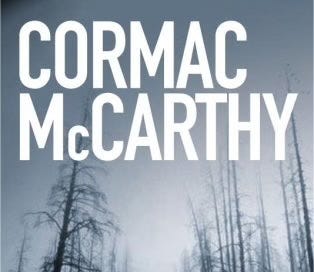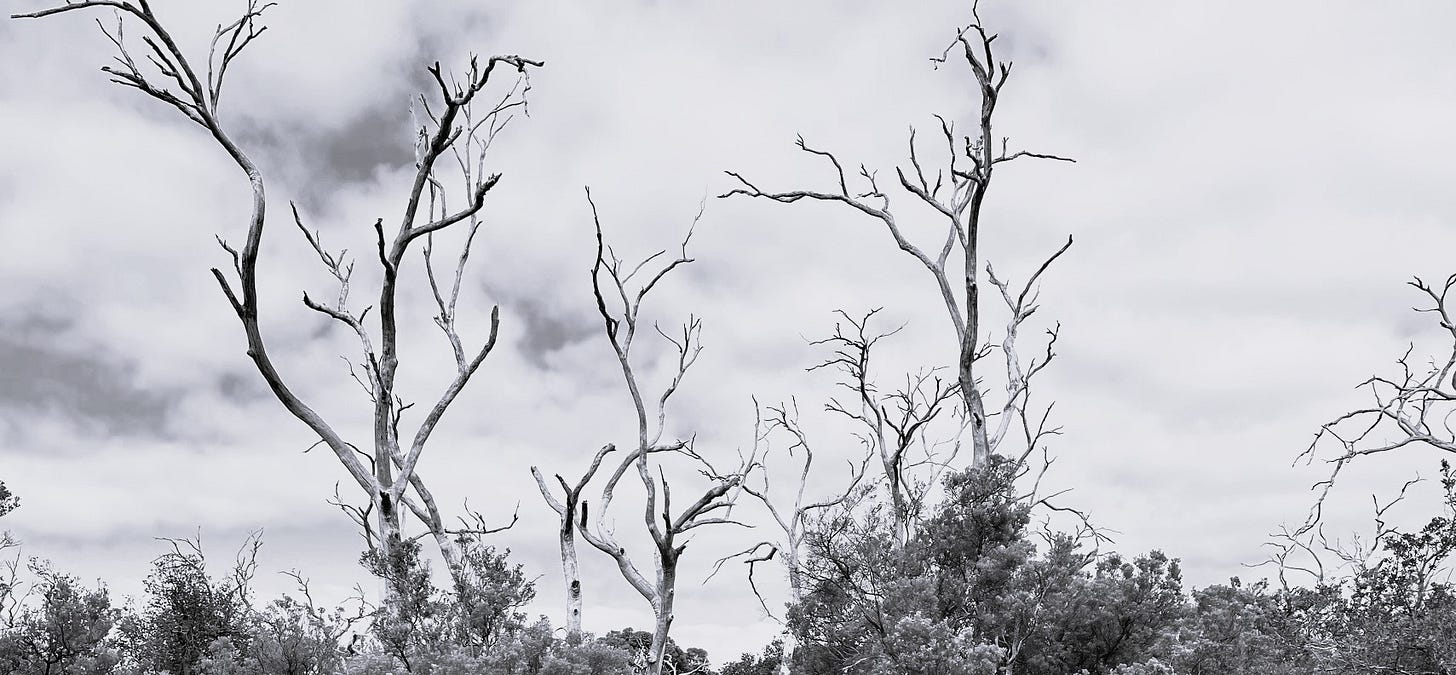Son: 'What’s the bravest thing you ever did?' Father: 'Getting up this morning.'
'The Road' by Cormac McCarthy
The Road by Cormac McCarthy (2006) is a bleak, sparsely written story of a father and his young son. There are no names given to the protagonists and the boy’s age is unknown. Not long before the boy was born, there was some sort of cataclysmic event that isn’t named either, but it left a charred, ashen landscape and not much else.
The boy’s mother chose to end her life rather than face this new desolate world. Now the boy and his father were on their own on the road going south. Winter was on its way and the coast would be warmer.
Then they set out along the blacktop in the gunmetal light, shuffling through the ash, each the other’s world entire.
Other people survived the catastrophe, but the father and son have only met cannibals and slave owners or desperate men who try to steal anything they can get their hands on.
When he woke in the woods in the dark and the cold of the night he’d reach out to touch the child sleeping beside him. Nights dark beyond darkness and the days more gray each one than what had gone before. Like the onset of some cold glaucoma dimming away the world. His hand rose and fell softly with each precious breath.
Once they discovered a stash of supplies in an underground cellar. Mostly they were hungry. He told his son they were starving but not dying. Not yet.
The father reassures his son that nothing bad can happen to them. They carry the fire. They are the good guys and there are other good guys. They just haven’t found them yet. “This is what the good guys do. They keep trying. They don’t give up.”
There were times when he sat watching the boy sleep that he would begin to sob uncontrollably but it wasn’t about death. He wasn’t sure what it was about but he thought it was about beauty or about goodness. Things that he’d no longer any way to think about at all.
The Road could have just been a depressing, nihilistic, post-apocalyptic novel. Instead, it is the story of the love of a father for his son, of his choice to hang on to life for the sake of that son when he would much rather be dead. I’ve been reading the Book of Job in the Old Testament. He lost all his children, everything he owned and then his health. His wife told him to curse God and die, as did the father’s wife in The Road, but neither of them took that advice. It tends to be mothers who are associated with sacrificial love for a child but the child’s mother, like Job’s wife, had no hope.
“Love…bears all things…hopes all things, endures all things.’’
McCarthy’s writing is beautiful despite his descriptions of a world that has barely escaped annihilation and its human remnants who have mostly descended into barbarism. As the father’s world was shrinking, he tried to cling to things he had known:
Make a list. Recite a litany. Remember.
As he washed his son’s hair and dried it, he thought of what he was doing as:
…some ancient anointing. So be it. Evoke the forms. Where you’ve nothing else construct ceremonies out of the air and breathe upon them.
This is the first book I’ve read by this author and I loved McCarthy’s descriptively rich but concise poetic writing.
The Old Testament tells us that in the end Job had everything restored to him. There’s no miraculous solution to the circumstances in The Road. It offers a glimmer of hope at the end but leaves a lot to the imagination. It has a powerful message of the kind of love that hopes in spite of the odds; a sacrificial love that is both tenacious and tender.
There are one or two brief scenes (pgs. 110 & 198) that are horrible (cannibalism). A movie has been made of the book that is apparently true to the story. I can handle reading something like this but definitely couldn’t watch it.
This sentence below is striking. We pass on what we know and believe in so many little ways. Our hearts give us away:
He could not enkindle in the heart of the child what was ashes in his own.






The Road was my first Cormac McCarthy read. I found it intense and gripping, though hard to read with all the graphic scenes. Still, overall, it was beautiful and hopeful as I watched the love the father had for his son by protecting him and preparing him for the time when he would no longer be with him.
I heard about this book as soon as it came out but until your review nothing I read about it made it seem worth my time. You’ve changed my mind.